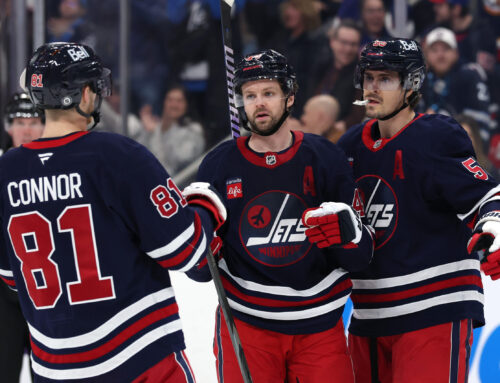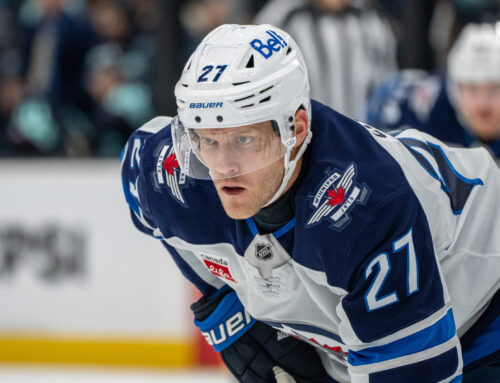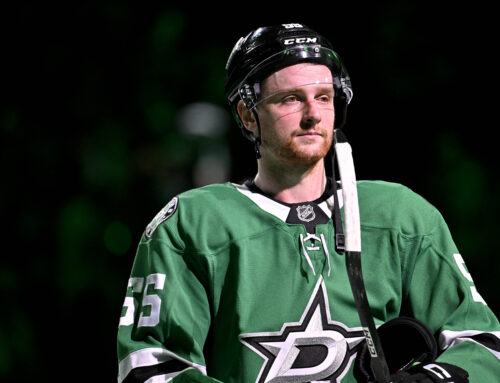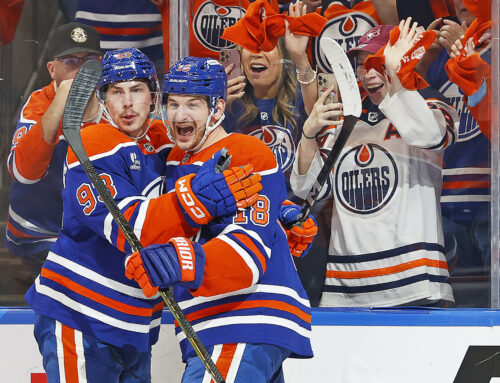
The tortoises and hares among Western Conference defensemen, three weeks into the season
Tortoises and Hares: Defensemen (2016/17)
If hot starts meant good seasons and slow starts meant bad seasons than Brian Savage would still be playing and Jarome Iginla would be out of the league. This early in the season wacky inflated shooting percentages can make players look a lot better than they really are. It is no different than a nine or ten game hot streak in the middle of season except that at this point it accounts for all the players points. Nine points in seven games in January will give a player a bump but it will not push an average player to the top scoring leaders as it can right now. The small sample size makes it very to overreact to hot starts and cold starts, as in the next couple weeks some fantasy players will start to panic because a star is off to a slow start. Thus if the hot and cold starts continue for much longer the selling high and buying low season will have officially begun. That makes it important to be able to identify the players for whom the hot, or cold, start is the real thing.
Tortoises
TJ Brodie – Calgary (0 goals & 2 assists in 9 games)
This is a far cry from Brodie’s 2015/16 season where he seemed to get assist on almost every Flame goal scored when he was on the ice. He finished that season having recorded an assist on nearly 42% of the Flames goals scored when he was on the ice. His two assists this year mean he is assisting on 17% of the Flame goals scored when he is on the ice. Those two numbers mark the extremes for him as he is often around 30%. With Hamilton and Giordano getting about 70% of the Flames power play time, and almost all the time with the top unit, Brodie relies heavily on his even strength production. The good news is that Brodie is shooting more this year which should make up for some of the drop off in assists that Brodie will see. Brodie will pick up the pace a bit this year but there is a lot of potential for disappointment this year as 40 points could be a struggle.
Mattias Ekholm – Nashville (0 goals & 1 assist in 8 games)
Even though Ekholm only has one point in his first eight games that is pretty much the only thing that has changed from last season. His shot rate, hit rate and block are basically unchanged. He is getting 21% of the Predator’s available power play time and has become a primary penalty killer but that has not taken away from his even strength ice time. The increased penalty killing time is something to keep an eye on as defensemen on get a lot of time on the penalty kill generally have a lower ceiling than they otherwise would. The craziest thing about Ekholm’s stat line is that as his one assist came at even strength he has assisted on 33% of the Preds’ goals scored when he is on the ice. It is not like the Predators are not shooting when he is on the ice either as they are averaging more shots per 60 minutes with Ekholm on the ice than they were last year. The Predators have a crazy low team shooting percentage at even strength, it is not yet time to worry about the Predators unless a specific player has seen a drop in their rate stats, that is not the case with Ekholm.
John Klingberg – Dallas (0 goals & 3 assists in 8 games)
Klingberg is another example of a player whose not getting the bounces, as his on-ice shooting percentage is just under 6.5%. That is two points below last year and three points below 2014/15. For Klingberg specifically it does not help that he is taking fewer shots this year than he has in past seasons by almost a full shot per game. That alone would work out to almost five fewer goals on the season given last year’s shooting percentage. The real problems for Klingberg are more on the team side, as the Stars are shooting less, at even strength as well as on the power play, and allowing more shots. Consequently the Stars are also scoring less, Klingberg has been on the ice for 2.15 goals per 60 minutes whereas he was on for more than three per 60 minutes in ach of the last two years. It also hurts that the Stars are only scoring on 14% of their power plays thus far. This is no doubt partially due to the rash of injuries, which have hit the Stars, but until things turn around Klingberg will not be the offensive force he has been in past years.
Jake Muzzin – Los Angeles (1 goal & 0 assists in 9 games)
Muzzin has some team effect working against him but there are also more negative signs than in the cases of Klingberg and Ekholm. Muzzin’s overall power play time per game is up very slightly while his percentage of available power play time is down from 49% to 46%. That is not a drastic change but it is the third year in a row in which his share of power play time has fallen, and the time he is getting is on the much weaker second unit. Additionally his percentage of penalty killing time is up to 46% while his total ice time per game has fallen by a minute per game from last year. Furthermore, his shots per game have fallen from two and a half shots per game to one and tow thirds shots per game, meaning a drop of almost a full shot per game. That would be a drop of five goals on the year using last year’s shooting percentage. Furthermore, in recent games Muzzin has been tasked with playing alongside either Brayden McNabb or Tom Gilbert while Alec Martinez has grabbed a spot alongside Drew Doughty. The net result is that if this usage continues, a weaker partner and time only on the second power play unit, Muzzin should looked at as 30–35 point defenseman as opposed to a 40+ guy.
Alex Edler – Vancouver (1 goal & 0 assists in 9 games)
Out all the defensemen on this list Edler is in the worst situation. The Canucks lack high end offensive talent after the Sedins and Loui Eriksson making it imperative that any offensive defensemen on the team get used with them especially on the power play. The redistribution of Edler’s minutes to a much more defensive role continues. He is seeing only 32.5% of the available power play time, with very little of that coming the Sedins. He is in fact under two minutes per game on the power play thus far. He is also being used on the penalty kill more as he now garners more than 50% of the available penalty killing minutes. The only positive is that his overall has stayed constant but he has traded prime power play minutes for even strength and penalty kill minutes. If the new distribution of his minutes were not bad enough Edler is also seeing his lowest percentage of offensive zone starts in the last five years. With this usage he could see his hits and blocks spike as his per game numbers are up in that respect but he probably was not drafted as a multi-cat contributor, if he was drafted at all. Edler may not even get 30 points this year if he stys healthy.
Hares
Ryan Suter – Minnesota (3 goals & 7 assists in 9 games)
This is the same start that Suter got off to last year, he is playing the percentage game and it will not last, just like last year. First look at his on-ice shooting percentage it has been around 7.5% for the last six years, whereas through nine games this year it is hanging around 13%. His own shooting percentage is even higher at 15% versus in the last when it was never exceeded five percent. Furthermore, just like last year he is scoring 20% of the goals when he is on the ice (IGP) and assisting on 40% of the goals (IAP). Compare that to the fact that in the last nine years his IGP has only 10 once while his IAP has only exceeded 30 twice. All of that points to at best a repeat of last year, meaning 50 points.
Alec Martinez – Los Angeles (2 goals & 5 assists in 9 games)
Martinez is putting up the type of numbers to start the season that were expected from Muzzin, not necessarily the nearly point per game but everything else is there. He is taking nearly three shots per game, while getting almost two hits per game and just two blocks per game. That puts him on pace for about 215 shots, 150 hits and 180 blocks, in other solid multi-cat numbers. Continuing at his current shot rate is entirely reasonable given he has shown the willingness to shoot a lot in the past and should he match last year’s shooting percentage of eight percent the potential is there for him to break 15 goals this year. That is all the more plausible given that he is getting a career high in total ice time and a career 44% of available power play time. Over the last three he and Doughty have been the most common defensive pairing for the Kings, meaning that everything is looking up for Martinez. In short this could be the year Martinez hit 40 points.
Cam Fowler – Anaheim (3 goals & 4 assists in 9 games)
For the last three years under Bruce Boudreau Fowler was being used in an increasingly defensive capacity even as his power play usage spiked last year. In 2012/13 he started 50% of his shifts in the offensive zone, it dipped to 45%, the result of a three year trend. During that time he also saw his ice time per game slip to just over 21 minutes per game but he is back up to 24 minutes per game this season. With the more offensive, and extended, minutes Fowler is averaging two shots per game and his on pace to take 150 shots for the first time in his career. With the increased shot rate Fowler could score 10 goals for the second time in his career, add in the power-play time and favourable usage and he could threaten 40 points for the first time since his rookie season. The biggest threat to that is the return of Hampus Lindholm and how that will effect the usage and playing time of the other defensemen.
Patrick Wiercioch – Colorado (1 goal & 4 assists in 7 games)
Wiercioch is averaging 3.51 points per 60 minutes at even strength. That sounds really good except that it is based on him being involved in every goal the Avalanche have scored while he is on the ice. That will not continue, but not all his underlying numbers are horribly unsustainable. For example he has played 41% of his even strength shifts, and 91% of his power play time, with Tyson Barrie. He is only seeing 16 minutes of ice time per game including less than a minute of power play time. He is making good use of his ice time as he is taking 1.25 shots per game, or more than four shots per 60 minutes. The limited ice time will make it tough for Wiercioch to put up serious points but the usage and being paired with Barrie could help him get to 30 points.
The statistics in this column came from the player profiles at Dobberhockey.com, Corsica.hockey, stats.hockeyanalysis.com and hockeyviz.com
One Comment
Leave A Comment
You must be logged in to post a comment.





 MTL
MTL EDM
EDM
 ANA
ANA VAN
VAN OTT
OTT DAL
DAL

Might wanna take another look at Fowler’s rookie season :P